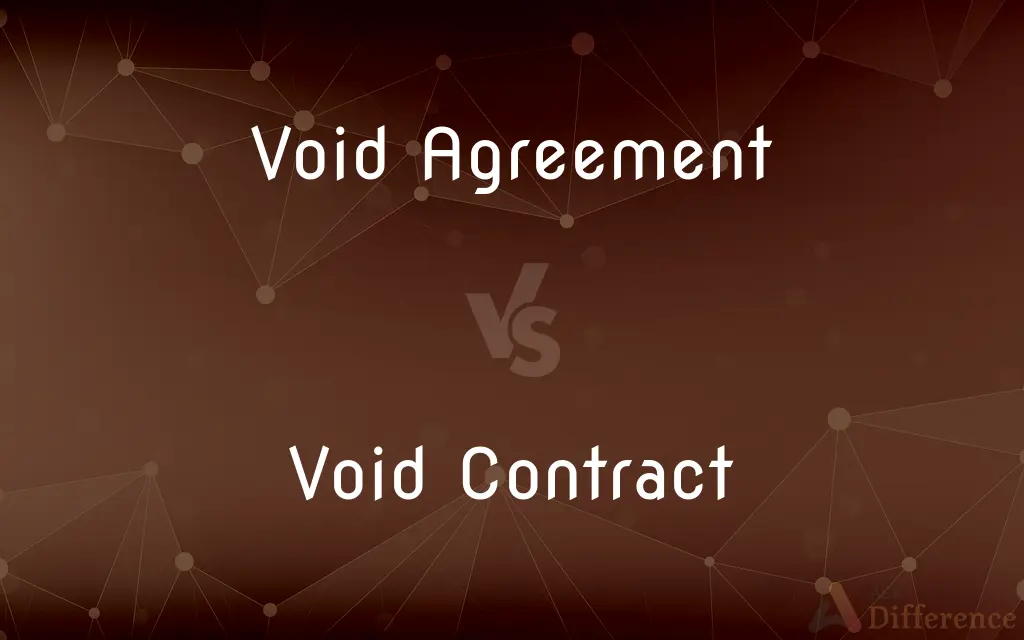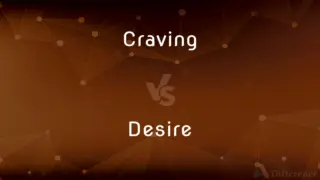Void Agreement vs. Void Contract — What's the Difference?
By Tayyaba Rehman — Published on October 12, 2023
Void Agreement is a deal lacking legal binding due to lawfulness from inception, while a Void Contract occurs when a legal pact loses its validity post-agreement due to impossibility or illegality.

Difference Between Void Agreement and Void Contract
Table of Contents
ADVERTISEMENT
Key Differences
The terms "Void Agreement" and "Void Contract" are significant in the realm of contract law, each presenting a different aspect of invalidity. A Void Agreement refers to an agreement that is void from the very beginning, having never been a valid contract due to lack of essential contract elements or because the purpose of the agreement is illegal or against public policy. It is an agreement that never comes into existence and has no legal effect, meaning it cannot be enforced by either party.
In contrast, a Void Contract is initially valid but becomes void due to subsequent illegality or impossibility of performance. It is a contract that was once enforceable by law but, due to changes in circumstances or unlawful acts by one of the involved parties, has lost its enforceability. A Void Contract can’t be legally fulfilled and neither party can recover damages based on non-performance of such contracts.
Understanding the difference between Void Agreement and Void Contract is paramount. The former is an agreement that has no legal standing from its inception due to intrinsic flaws or illegal purpose. It is not recognized by the law as a valid contract because it lacks the fundamental elements required to form a legal bond.
Conversely, a Void Contract was initially valid and binding but has lost its validity due to changes in law or circumstance or due to the actions of one of the contracting parties. In essence, while a Void Agreement is nonexistent from the start, a Void Contract existed but is no longer enforceable.
Comparison Chart
Validity
Never valid from inception
Initially valid but later becomes invalid
ADVERTISEMENT
Legal Enforcement
Cannot be enforced by either party
Initially enforceable but loses this status
Occurrence
Due to lack of essential elements or illegality
Due to subsequent impossibility or illegality
Recoverability
Neither party can recover damages
Neither party can recover damages
Existence
Nonexistent from the start
Existed but is no longer enforceable
Compare with Definitions
Void Agreement
Void Agreements are contracts that never acquire legal status due to their unlawful or immoral purpose.
A mutual agreement to commit a crime is a void agreement with no legal effect.
Void Contract
A Void Contract is a once-valid agreement that has lost its legality and enforceability.
The contract became a void contract due to subsequent changes in legislation.
Void Agreement
A Void Agreement is legally nonexistent, having no binding effect on the involved parties.
The agreement to sell stolen property was void and unenforceable.
Void Contract
Void Contract implies an initially lawful pact that later becomes unenforceable due to impossibility or illegality.
A contract to purchase a banned product is considered a void contract.
Void Agreement
A Void Agreement is inherently unenforceable as it lacks the foundational components of a valid contract.
An agreement without consideration is categorized as a void agreement, unenforceable by law.
Void Contract
A Void Contract is rendered non-binding due to alterations in law or a breach of the agreement’s terms.
The breach of contractual terms transformed the agreement into a void contract.
Void Agreement
A Void Agreement is one that is null from its inception due to illegality or lack of essential elements.
The deal to trade illegal substances was a void agreement, having no legal validity.
Void Contract
Void Contracts, initially legal, cannot be fulfilled and offer no legal remedies for non-performance.
The legally executed contract turned void when the subject matter was declared illegal.
Void Agreement
Void Agreement implies an arrangement that the law never recognizes due to inherent flaws or illegality.
An agreement for a prohibited act is a void agreement and has no legal standing.
Void Contract
A Void Contract is an agreement that, due to subsequent events, loses its binding nature and legal enforceability.
The enactment of new laws rendered the existing contract a void contract.
Common Curiosities
What is a Void Agreement?
A Void Agreement is an arrangement that is null and legally nonexistent from its inception due to illegality or lack of essential elements.
Can parties recover damages in a Void Agreement?
No, since a Void Agreement has no legal standing, no party can recover damages.
Can a Void Contract be rectified and enforced?
No, once a contract is declared void, it cannot be rectified or enforced.
What does Void Contract mean?
A Void Contract is an initially valid agreement that loses its legality and enforceability due to subsequent events or actions.
Are Void Agreements and Void Contracts the same?
No, a Void Agreement is never valid, while a Void Contract is a contract that becomes invalid after being created validly.
Can a party sue for breach of a Void Contract?
No, as a Void Contract is not enforceable, parties cannot sue for breach.
Can a Void Agreement be enforced by law?
No, a Void Agreement cannot be enforced by law as it is invalid from the beginning.
Why do Void Agreements occur?
Void Agreements occur due to the absence of essential contract elements or involvement in illegal or immoral activities.
What leads to a Void Contract?
Changes in law, impossibility of performance, or illegality occurring after the formation lead to a Void Contract.
Can a Void Contract be revived?
No, once a contract becomes void, it cannot be revived or enforced.
Can damages be claimed in a Void Contract?
No, in a Void Contract, neither party can claim damages as the contract is unenforceable.
Is a Void Agreement legally binding?
No, a Void Agreement is not legally binding and has no enforceability.
Share Your Discovery

Previous Comparison
Retail Banking vs. Corporate Banking
Next Comparison
Craving vs. DesireAuthor Spotlight
Written by
Tayyaba RehmanTayyaba Rehman is a distinguished writer, currently serving as a primary contributor to askdifference.com. As a researcher in semantics and etymology, Tayyaba's passion for the complexity of languages and their distinctions has found a perfect home on the platform. Tayyaba delves into the intricacies of language, distinguishing between commonly confused words and phrases, thereby providing clarity for readers worldwide.














































